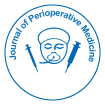
Journal of Perioperative Medicine
Open Access
ISSN: 2684-1290

ISSN: 2684-1290
Commentary - (2023)Volume 6, Issue 3
Perioperative medicine is an interdisciplinary medical approach that involves the preoperative, intraoperative, and postoperative management of patients undergoing surgery. One of the most significant patient populations that can benefit from perioperative medicine is the elderly. As the population ages, the need for surgical procedures increases, and the use of perioperative medicine can improve surgical outcomes and enhance patient care. In this article, we will explore the benefits of perioperative medicine for elderly patients.
Preoperative assessment
Preoperative assessment is a critical component of perioperative medicine. It involves a comprehensive evaluation of a patient's medical history, medications, and physical condition to identify any potential risks that may increase the likelihood of complications during or after surgery. For elderly patients, preoperative assessment is especially important because they are more likely to have multiple chronic medical conditions that may affect their surgical outcomes.
By identifying and managing these conditions before surgery, perioperative medicine can reduce the risk of complications, such as infections, cardiac events, and pulmonary complications. This can improve the patient's overall health and reduce their risk of readmission to the hospital.
Optimization of chronic medical conditions
Perioperative medicine also focuses on the optimization of chronic medical conditions, such as diabetes, hypertension, and heart disease, before surgery. For elderly patients, these conditions are more prevalent and may require more intensive management.
Optimizing these conditions before surgery can improve surgical outcomes and reduce the risk of complications. For example, managing blood glucose levels in patients with diabetes can reduce the risk of wound infections and improve wound healing. Optimizing blood pressure control in patients with hypertension can reduce the risk of cardiac events during and after surgery.
Enhanced Recovery After Surgery (ERAS) protocols
ERAS protocols are a multimodal approach to patient care that involves a combination of preoperative counseling, pain management, nutrition optimization, and physical therapy. ERAS protocols are designed to reduce the stress response to surgery and improve surgical outcomes.
For elderly patients, ERAS protocols can be particularly beneficial. They can help reduce the length of hospital stays, improve pain control, and reduce the risk of complications. ERAS protocols can also improve functional recovery after surgery, allowing elderly patients to regain their independence more quickly.
Postoperative pain management
Pain management is an essential component of perioperative medicine, and it is particularly important for elderly patients. Chronic pain is more prevalent in elderly patients and can affect their quality of life. Inadequate pain control after surgery can also lead to complications, such as delirium, increased length of hospital stay, and decreased functional recovery.
Perioperative medicine can improve pain control after surgery by using a multimodal approach to pain management. This approach involves the use of regional anesthesia, non-opioid pain medications, and nerve blocks, which can reduce the need for opioids after surgery. By reducing the use of opioids, perioperative medicine can also reduce the risk of opioid dependence, which is a significant concern for elderly patients.
Reduced length of hospital stay
Elderly patients are more likely to experience prolonged hospital stays after surgery. This can lead to increased healthcare costs, increased risk of complications, and decreased functional recovery.
Perioperative medicine can help reduce the length of hospital stays by optimizing chronic medical conditions before surgery, managing pain after surgery, and using ERAS protocols.
By reducing the length of hospital stays, elderly patients can return home sooner, reducing the risk of hospital-acquired infections and improving their overall quality of life. They can also resume their normal daily activities more quickly, improving their functional recovery after surgery.
Perioperative medicine can significantly improve surgical outcomes and enhance patient care for elderly patients. By focusing on preoperative assessment, optimizing chronic medical conditions, using ERAS protocols, managing.
Citation: Clyde M (2023) Perioperative Medicine Benefits for Elderly Patients. J Perioper Med. 6:165.
Received: 03-May-2023, Manuscript No. JPME-23-24129 ; Editor assigned: 05-May-2023, Pre QC No. JPME-23-24129 (PQ); Reviewed: 19-May-2023, QC No. JPME-23-24129 ; Revised: 26-May-2023, Manuscript No. JPME-23-24129 (R); Published: 02-Jun-2023 , DOI: 10.35248/2684-1290.23.6.165
Copyright: © 2023 Clyde M. This is an open-access article distributed under the terms of the Creative Commons Attribution License, which permits unrestricted use, distribution, and reproduction in any medium, provided the original author and source are credited.